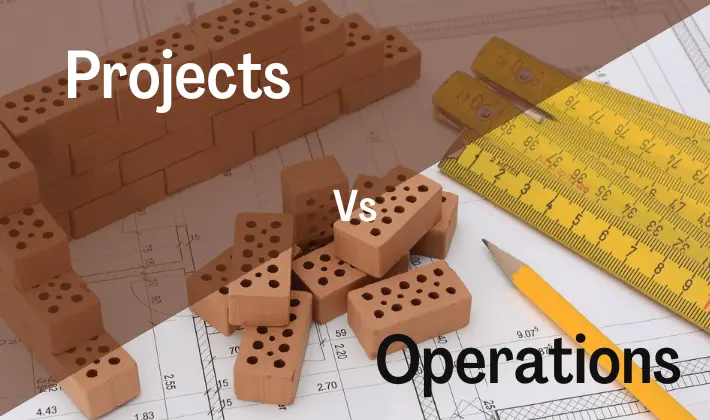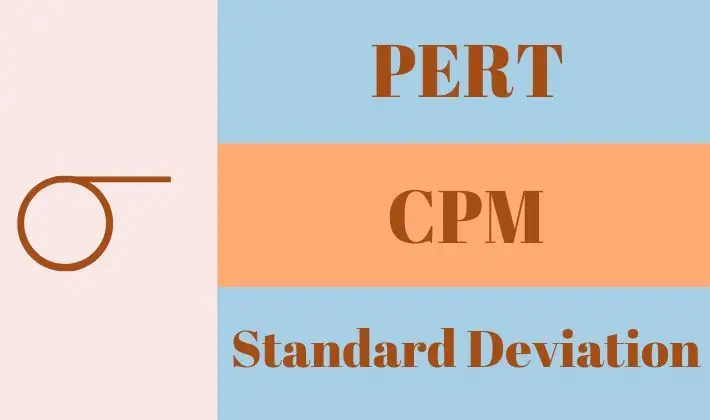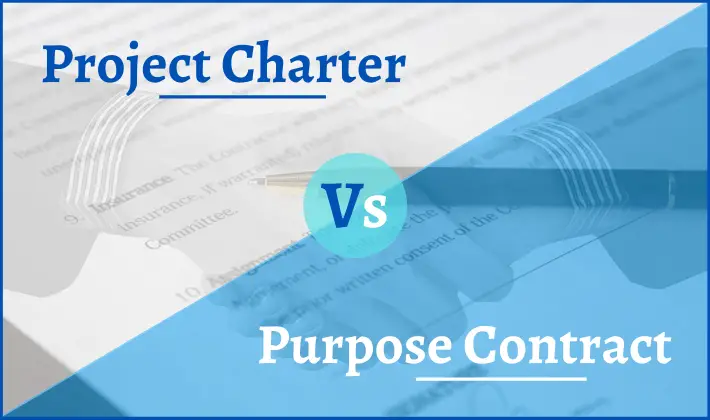As per the PMBOK Guide, a project can be defined as a temporary endeavor undertaken to create a unique product, service, or result.
The main difference between projects and operations is that operations are not projects i.e., Operational work is neither temporary nor produces unique results.
I have written this post to delve into the differences between projects and operations. It contains some examples that will help you to distinguish between these project management terms. Understanding the difference is important if you are preparing for the PMP (Project Management Professional) exam that is conducted by PMI (Project Management Institute) because the exams test your project management knowledge.
Additionally, you will find similarities between these two terms in this post. This post also gives a brief overview of product lifecycle and talks about why both projects and operations are important for the business of an organization.
For a quick overviews of the difference between these terms, you can watch the following video.
What are Projects?
A project is a temporary endeavor undertaken to create a unique product, service, or result.
The crux of the definition is in two keywords: “temporary” and “unique.”
Temporary means that the effort has a timeline (start date and end date) whereas Unique refers to an end result that has a novelty and has not been done before.
Temporary doesn’t refer to the end result of a project. It does not mean the project’s result is insignificant or of low value. It also does not mean that the endeavor is short-term. Temporary simply means that there is a specific start and end date for the project.
Projects do not continue forever and they produce something new when they finish. They can be viewed as an agent for change.
Projects are inherently risky and they improve competitive advantage. All project goals are met in a successful project.
A software like Microsoft Project can be used for project management.
Note: Some of the projects may leave behind long lasting results. The great Egyptian pyramids have been in existence since 2500 B.C. but they still are still relevant today.
Examples of Projects
Let’s look at some business world examples of projects:
- Digging an oil well
- Developing an e-commerce website
- Designing a new car
- Constructing a highway
Projects are not unique to the business world. We also undertake a few projects during our lifetime. Here are some examples:
- Landscaping a Garden
- Renovating a kitchen
- Organizing a birthday party
- Running a marathon
What are Operations?
Operations can be simply described as something that are not projects. They are not temporary i.e. they do not have a defined end date and they do not produce anything unique. They are ongoing, repetitive, and maintain a status quo.
Operations management involves routine and repetitive tasks that are required for business administration. They sustain a business.
Although an operation is non-temporary, it cannot be termed as permanent. Operations are usually discontinued when there is no market demand for the product it maintains. This may happen after a few years or few decades but it totally depends on market dynamics.
Operations manager change as operations are maintained over a long period of time.
A software like Microsoft Dynamics can be used for operations management.
Examples of Operations
Let’s look at some business world examples of operations:
- Manufacturing of ingots
- Supplying cement to a construction company
- Textile production
- Running a departmental store
Our daily life is full of operations. Here are some examples:
- Drive to work
- Prepare and cook meals
- Buy groceries
Difference Between Projects and Operations
| S.No. | Projects | Operations | |
|---|---|---|---|
| 1 | Definition | A project is a temporary endeavor to create a unique product, service, or result. | Operations are ongoing activities that are repetitively done to produce or maintain the project’s outcome. |
| 2 | Product | Produces a unique product, service or result. | Produces non-unique and repetitive results. |
| 3 | Duration | Temporary – specific start and end date. A project ceases to exist after final result has been delivered. | Ongoing – have a start date but no defined end date. Operations can continue for a very long time till there is a market demand for the product. |
| 4 | Change | Brings in a significant change by introducing a new product or service in the society. | Maintain status quo. Same things are repeated everyday. |
| 5 | Knowledge | Generates new knowledge that was not there before the project started. | Runs on existing and pre-defined knowledge that was generated during the course of a project. |
| 6 | Risk | Since they bring about a change, they are inherently risky. | Since they follow a definite and repetitive pattern, they are not as risky. |
| 7 | Closure | Projects are closed when the objectives are met or terminated when it is no longer feasible to reach the defined objectives. | Operations are closed only when there is no foreseeable market demand. |
| 8 | Benefits | Projects are initiated because of various reasons – to earn profit, do a social service, bring in a technological change, conform to government regulations etc. | Operations are performed to maintain a product or to sustain a business. |
| 9 | Timeline | Projects exists while a product is being made and implemented or while a new service is being designed and deployed. | Operations start only after a new product or service is launched. |
| 10 | Responsibility | Managed by a project managers. Usually same manager handles the project throughout its life cycle. | Managed by an operations managers, who are changed periodically for multi-year operations |
Similarities Between Projects and Operations
Although projects and operations cater to altogether different aspects of the business world, there are many similarities between them.
- Both are planned, executed, and monitored & controlled.
- Both are necessary to reach business goals.
- Both are limited by resources, time, and budget.
- Both are done by people.
Product Lifecycle
A product lifecycle is a collections of projects and operations. It starts with a project that created the initial product or service. The first project is followed by an operation, which is used to maintain the product or service.
Just before the an individual project is completed, the project manager and project team hands over the product (along with its complete knowledge-base) to the operations manager.
Subsequently, many more projects might be initiated during the product lifecycle to upgrade the initial product or service.
Operations management starts after the first project and continues till the end of product lifecycle. The final phase of product lifecycle is product retirement when the product is taken out of the market and operations are closed.
You can look at the following video to understand the difference between product and project lifecycle.
Importance of Projects and Operations
Some people believe that projects are more important than operations because they bring about a change. Nothing can be farther from the truth.
Both projects and operations have a role to play in the business world. In fact, operations employ more people in the world and generate far more GDP (Gross Domestic Product) than projects.
Some businesses revolve around projects e.g. software services and business consulting whereas other businesses thrive or operations e.g. cement manufacturing and goods transportation. However, the business of most large companies utilizes both projects and operations e.g. mining companies and automobile manufacturers.
Over to You
What is you take on projects and operations? Is one more important than the other? Does your work involve more or projects or operations?
I will love to hear from you.










Thanks very much it’s really helpful